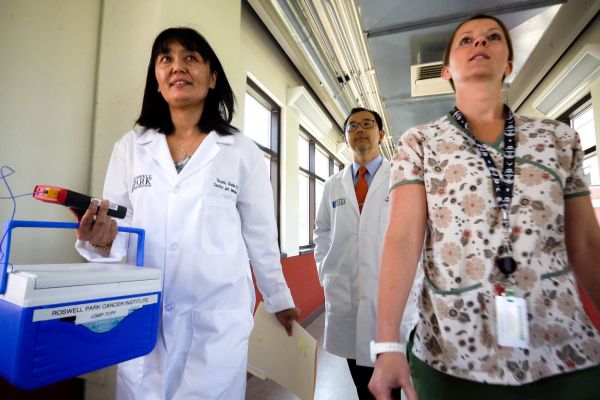Many patients at Roswell Park are eligible to enroll in a clinical trial, which can provide an additional treatment option. But what are clinical trials? How do they work? And how can you find one for your type of cancer?
Clinical trials are research studies that involve people. In the field of cancer, they are designed to evaluate promising new treatments, including new ways of using existing treatments (such as surgery or radiation therapy). Information generated by clinical trials helps us improve treatments and quality of life for people who have cancer.
In the U.S., all new drugs must be studied in clinical trials before they can be approved by the Food and Drug Administration (FDA). From Advil to Zoloft, all drugs on the market had to go through the same approval process — and people had to volunteer to participate in the clinical trials that led to FDA approval. Roswell Park patients who enrolled in clinical trials provided critical data that led to FDA approval of trastuzumab /Herceptin® (breast cancer), imatinib / Gleevec® (leukemia), ipilimumab / Yervoy® (melanoma) and other drugs — and consequently, they were among the first patients to benefit from those drugs.
Four Phases — and What They Mean
There are four phases in the clinical trials process. There must be positive/promising results from one trial before the process can move to the next phase.
The process begins with basic research in the laboratory.
- Phase 1: Once the drug has been approved for testing in humans, a phase 1 trial will determine the highest dose that can be given safely. Phase 1 studies are done with a group of people who have a specific disease or genetic mutation.
- Phase 2 studies include more people than phase 1 studies. This phase seeks to find out if the drug works, and to identify the safest and most effective dose that has the fewest side effects.
- Phase 3 studies may involve hundreds or thousands of participants and may take place in multiple locations. A phase 3 clinical trial usually compares the current standard “best treatment” with the study drug. Participants are randomly assigned to one of two (or more) treatment “arms,” which means some people will receive the new drug and others will receive the current standard treatment, so the two treatments can be compared. Results of phase 3 studies provide the evidence the FDA will use to decide whether or not to approve the drug.
- Phase 4 studies begin after a drug is FDA-approved and released for use. These studies look for safety or side-effect issues that may not have shown up in earlier testing.
Some clinical trials include both phase 1 and phase 2. If you enroll in a trial like this, you will be informed which phase you are participating in.
Clinical trials are run under very strict rules with specific protections for participants. One basic protection is called informed consent, which is explained below.
What About Placebos?
A placebo is a treatment that has no beneficial effect. It is rare for a cancer treatment clinical trial to involve a placebo. One exception is that placebos may be used in a clinical trial to compare a standard treatment plus a placebo to the same standard treatment plus the new treatment being studied. You always will be told if the study uses a placebo.
Weighing Risks and Benefits
If you are thinking about participating in a clinical trial, the FDA recommends that you understand the different types of trial, what questions to ask, and your rights as a participant. You should also consider the risks and benefits and what to expect for each trial you are considering.
Risks
- In a comparison study, you do not get to decide which treatment you receive.
- The new treatment may have unknown side effects or other risks, which may or may not be worse than those of existing treatments.
- As with other forms of therapy, the new treatment may not work for you even if it helps others.
Benefits
- You may get access to a treatment that’s not available outside of the trial.
- You will be closely monitored during the study and cared for by top physicians, scientists and nurses.
- You can contribute to medical advancements that could save and improve the lives of others who have cancer.
- You can take an active role in your care.
You should also be aware that if you enroll in a clinical trial, you will be monitored closely, so you will likely have frequent testing and clinic visits.
How Can I Find Clinical Trials for My Type of Cancer?
Talk with your Roswell Park doctor to find out if you are eligible for any clinical trials. You’ll also find clinical trials listed on the websites below — but keep in mind that the information they provide may not be up to date:
What Should I Ask?
- What clinical trials are available for me at Roswell Park?
- What about trials at other locations?
- If there are trials available for you, here are some questions to ask your doctor.
What About Insurance and Costs?
The Affordable Care Act requires that newer health insurance plans (since 2010) cover routine costs of care for people enrolled in approved clinical trials. Learn more.
What’s Informed Consent?
Informed consent is a process in which you formally agree to participate in a clinical trial and are informed of your rights as a participant. You will learn the purpose/goal of the study, details about the trial – protocol, tests, treatments, risks and benefits, length of the study, costs, insurance coverage, any alternative treatments that may be available, whom to contact with questions or about side effects, and when to call.
This is your chance to ask questions. You may want to bring someone with you to take notes. The medical language may be new to you, and you will get a lot of information! You do not have to sign on the spot. You can ask for a copy of the documents and take them home for review. It’s a good idea to keep a copy with all your medical records.
Clinical Trials at Roswell Park
Learn more about clinical trials at Roswell Park, and find out about the role of our Office of Research Subject Protection.
If you have general questions about clinical trials at Roswell Park, please call 1-800-ROSWELL (1-800-767-9355).

